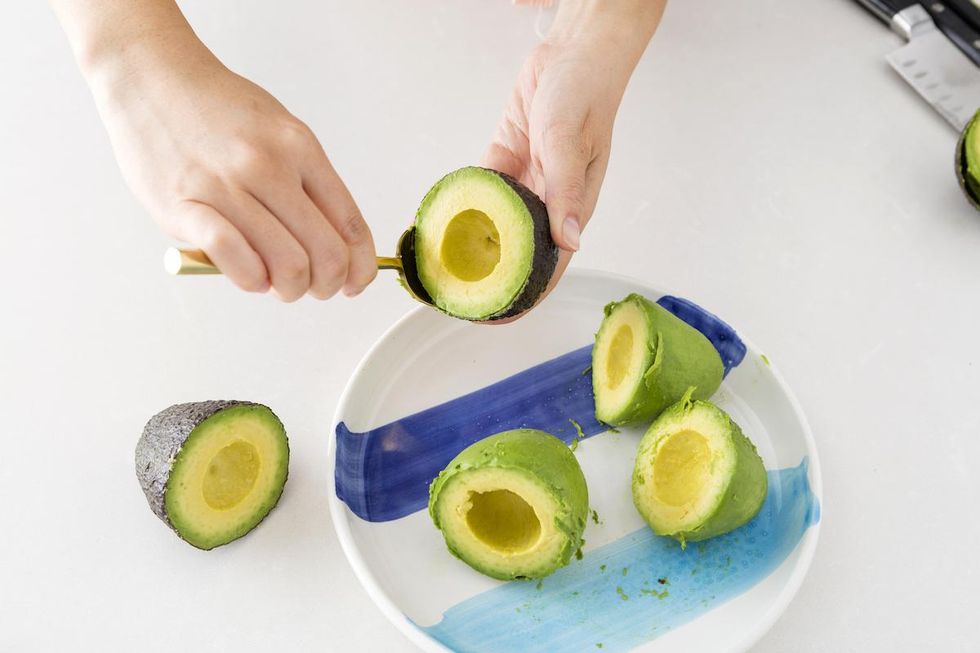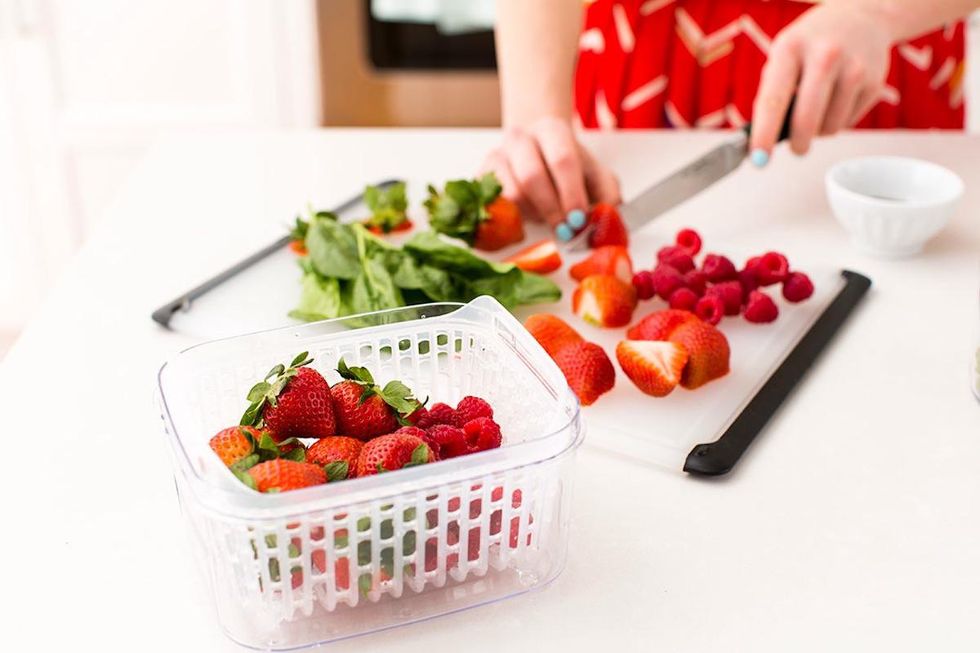What to watch out for — and how to stay hydrated this summer.
4 Surprising Signs You Might Actually Be Dehydrated

Warm weather always inspires us to make a beeline for the nearest lake or beach. While most of us remember to bring the essentials — our favorite pair of sunnies, a book, sunscreen, and a water bottle — few are fully aware of the less obvious health risks that can come with having fun in the sun, many of them from dehydration. We talked with Elke Cooke, MD, a California-based doctor who specializes in emergency and functional medicine for women, to get a list of sneaky symptoms to look out for plus a guide of water-rich foods to reach for this summer.
Cooke reminds us that though water is vital to the human body, it's often forgotten in dietary recommendations. “Sixty percent of our body is made of water, and it acts as a building material, solvent, reactant, carrier for nutrients and toxic waste products, temperature regulator, lubricant, and shock absorber," she says. “Water is non-negotiable and yes, it's a nutrient!"
So how long does it actually take to start experiencing some of the sneaky (and scary) symptoms of dehydration? According to Cooke, it could be as little as a day. “Withhold water for just one day and symptoms will start becoming apparent; fail to get enough water for three days and all systems crash [and] come to a screeching halt. A good general rule is to drink half your body weight in ounces and to check the color of your urine — it should be mostly clear with a tinge of yellow rather than dark orange."
4 Surprising Signs You Might Be Suffering From Dehydration

Brain Fog, Excessive Fatigue, and Irritability
Having trouble focusing at work or feeling extra frustrated? Dehydration could be the culprit. “More recently, it has been shown that mild dehydration (corresponding to only one to two percent of body weight loss in adults) can lead to a significant impairment in cognitive functions like alertness, concentration, and short-term memory," Cooke points out.
Weight Gain
Though it might seem counterintuitive, not getting enough water can be the cause of weight gain. Cooke explains, “Water is a critical element to help maintain the detox pathways in the body, especially the kidneys and bowel. Hydration aids in regular bowel movements, which in turn helps remove toxins. The accumulation of toxins will promote inflammation and therefore weight gain. Hydration equals detoxification."
Gas and Bloating
“In order to produce the seven liters of digestive juices on a daily basis, we need to take in enough water," Cooke shares. “Without this, our digestive system is limited, [and] protein and fats do not get broken down effectively. In our digestive tract, this will translate into bloating as larger undigested food particles are then metabolized by certain gut bacteria rather than absorbed into our circulation for nutrition."
Stomach Ulcers
“The stomach produces a thick layer of mucus to protect its lining from the harsh acidic gastric fluid needed for digestion," Cooke explains. “Chronic dehydration prevents normal mucus production and increases the risk for stomach ulcers." Yikes!
6 Dehydration-Fighting Foods to Add to Your Diet This Summer
Staying hydrated is about more than just drinking enough water; it's also about what you eat. “You can't go wrong by eating fresh, raw fruits and vegetables; they have a naturally occurring nutrient and water content," Cooke says. Here are six foods she reaches for to stay healthy during the summer season.

Salt
“Salt is key for maintaining proper fluid balance and hydration; you might be low on sodium if you start feeling muscle cramps," Cooke notes. “Because just drinking plain water isn't enough to hydrate us, try adding a pinch of unrefined sea salt to it — it contains over 80 minerals!" Have a chronic medical condition? Consult with your doctor before adding salt to your water.
Avocados
Need an excuse to go for the guac? Consider this it. “While avocados might not look like a hydrating food, they're a great source of potassium, healthy fiber, and the good type of fat that helps your body retain water," Cooke says.
Cauliflower
Cauliflower clocks in with a super impressive water content at 91 percent. “This vegetable also makes my list because it packs a healthy punch of vitamins and minerals. Even more, it shines because of its cancer-fighting compounds, glucosinolates," Cooke says.
Bananas
Bananas have a number of healthy qualities that make them especially great before or after a workout. “Bananas are rich in potassium and magnesium as well as healthy carbohydrates," Cooke says. “For a quick pick-me-up on a hot summer day, try them frozen."

Chia Pudding
“Did you know that soaked chia seeds absorb 10 times their weight in water? These are the ultimate hydration rockstars and are great for blood sugar balance," Cooke notes. “Even more, chia seeds are high in protein, fiber, essential fatty acids, and calcium.“ Cooke offers her recipe for a chia pudding that'll help you stay hydrated: Soak one-third cup chia seeds overnight in two cups of almond milk (or fresh coconut water) and top 'em with fresh berries. "Just avoid eating unsoaked chia seeds, because they can actually dehydrate you," she warns.
Berries
Cooke reminds us to reach for berries year-round. “Here's the lowdown on these little gems: All berries have a high water content of up to 92 percent. They're also packed with fiber and [are] some of the best sources for antioxidants." Enjoy your berries on yogurt or salads, in baked treats, or on their own. Yum!
How do you fight dehydration? Tell us about your favorite water-rich foods or go-to water bottle on Twitter @BritandCo!
This post has been updated.



















